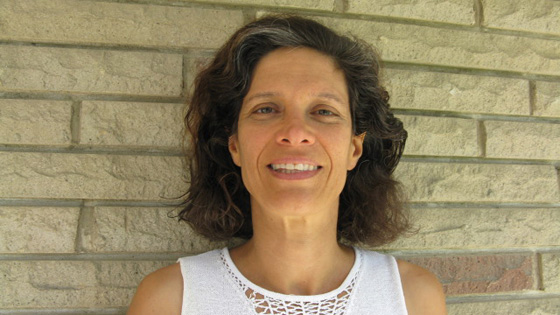
Rosemary Frei, 50, is one of a small handful of living donors who donated her kidney anonymously. (Photo: Rosemary Frei)
If your child needed a kidney, would you give them one? What about your spouse? What about a total stranger?
If you answered no to the last question, you're not alone, only one of the 80 live kidney transplants performed last year at Toronto General Hospital (TGH) were from anonymous donors. One of those donors described her experience and explained why she answered yes.
An acquaintance in need
At any point in time, there are more than 1,000 patients awaiting kidney transplants in Ontario, resulting in wait times of between six and 10 years in the GTA. While they wait, patients must undergo dialysis. At UHN, 50 per cent of patients undergo treatments three times per week at hospital to have waste and water removed from their blood. The remainder of patients have the options of doing dialysis at home (with either peritoneal dialysis or nightly hemodialysis), typically with an augmented schedule. In addition, some patients have the option of doing nightly hemodialysis at the hospital.
Rosemary Frei, a 50-year-old Toronto resident, learned during a conversation over a cup of tea in her backyard that someone she knew was facing dialysis, and decided to become a living donor.
"I had a few neighbours over one afternoon several years ago and one woman confided to me that she suffered from chronic kidney disease and would eventually need a transplant," said Frei. "Spontaneously, I said I'd be happy to be tested for compatibility. The next day I called Toronto General Hospital and started the process."
Cold feet
"Not long after I completed the screening tests, I told a surgeon I know through work about what I was doing. He said I should ask myself if I would be willing to die for this person, and unless the answer was 'yes,' to rethink it," said Frei. "He's a surgeon so I listened to him and called the hospital to tell them I changed my mind."
According to Dr. Joseph Kim, co-director, Living Kidney Donor Program, Toronto General Hospital, living kidney donors have the same quality of life as non-donors and are no more likely to experience kidney failure or hypertension than anyone else.
"Fewer than one in 7,500 people die while donating a kidney," said Kim. "And not a single person has died at TGH, due in large part to the development of a multidisciplinary team of surgeons, physicians, nurses, occupational therapists, pain specialists, social workers, psychiatrists and many others working closely together.
A brush with food poisoning
Several years later a bad case of food poisoning caused Frei to reconsider donating her kidney.
"I was travelling on business when I picked up an absolutely merciless stomach bug. In the small hours of the morning while I was lying on a bathroom floor clutching my stomach, I started thinking about what I would regret if I were to die," said Frei. "It occurred to me that not donating a kidney would be a major regret."
A week later Frei called the Living Donor Program at TGH and asked to restart the donor evaluation. She completed the medical tests and her nephrologist pronounced her fit to donate.
"I was more worried about the psychological assessment," said Frei. "I thought the surgical psychiatrist might uncover some deep, dark pathology that would prevent me from being a donor but it went well. She sized me up quickly and we spent a lot of our time talking about family and travel."
The call
Frei agreed to join the Living Donor Paired Exchange program and became a link in a chain of kidney donations set to take place simultaneously across Ontario. The program finds people who are willing to donate, but aren't a match for their own loved one - and pairs them with each other. By stepping in for someone who didn't have a willing donor, Frei's anonymous donation made two transplants possible, and took two patients off the waiting list for organs from deceased donors.
"My surgeon called me a month before the surgery to tell me the date," said Frei. "I wasn't nervous, I'd waited so long that I was excited about finishing the journey. I was admitted to the hospital the night before for final tests and went into surgery early the next morning. When I came to in the evening the urologist told me it was one of the easiest living-donor nephrectomies he's done— 'like plucking an apple from a tree.'"
No regrets
Frei's remaining kidney took over for its missing counterpart and she felt back to normal a month later.
"If you had asked me sometime during the first week whether I would make the same choice again, I may have had a different answer," said Frei. "But today I have no regrets, only a permanent ego boost from knowing I gave someone their life back."
Her only memento of the life she saved is a small tile given to her by the recipient's family, which she keeps in her living room. Inscribed on it are the words "every charitable act is a stepping stone towards heaven."
Related
Learn more about the Living Donor Program at UHN.
